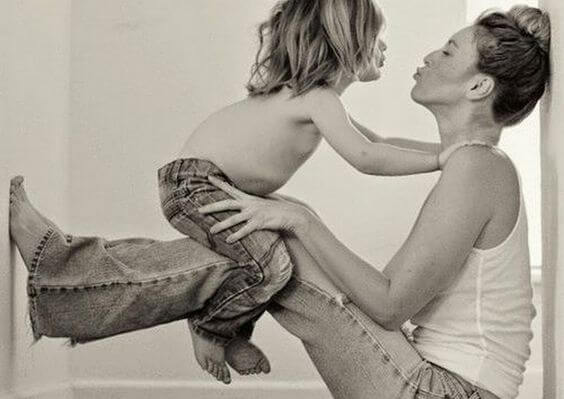Perfect Children Are Sad Children

Perfect children don’t always know how to smile, nor do they know the sound of happiness. They’re afraid to make mistakes and never reach the very high expectations of their parents. Their education is not based on freedom or acknowledgement, but rather on the authority of a strict and demanding voice.
According to the American Psychological Association (APA), depression in teenagers is already a very serious problem in our day and age. Excessive demand from parents, easily translates into a lack of self-esteem, anxiety and a great emotional discomfort.
Education must always be the foundation of happiness, self-discovery, and not a guideline based solely on perfecting, where the child’s rights are completely vetoed.
Something we must always keep in mind is that demands during childhood leave an irreversible mark on the adult brain. We never see ourselves as competent enough, nor are we perfect enough based on the ideals that were instilled in us. We must, therefore, break this limiting bond that stifles our ability to be happy.

Perfect children: when the culture of effort is taken to extremes
It is often said education is not rigorous enough, that teachers and parents are overly permissive, and students have very little tolerance for frustration. However, this is not entirely true. Generally, and even more so in times of crisis, parents seek “excellence” in their children.
If a child gets a B in math, they are pressured to get an A+. Their afternoons are filled with extracurricular classes, and their leisure time is limited to looking for more competitions. This brings about stress, exhaustion and helplessness.
The Price of Privilege, is an interesting book published by Dr. Madeleine Levine, where she explains how in our need to bring up perfect children who are ready for the future, what we’re really achieving is the upbringing of kids who are “disconnected from happiness.”
To teach is to be able to exercise authority with love, guiding their steps safely and with affection, because childhood is a reserve fund for your entire life.

The consequences of demanding too much from children
There is something we should keep in mind. We can educate our children in the culture of effort. We can and should demand certain things from them. Of this there is no doubt, but everything has its limit. This limit is to accompany your demands with an unconditional cushion of love and acceptance.
On the contrary, our perfect kids will be sad kids who will experience the following sensations:
- Dependency and passivity: A child accustomed to being told what to do will stop making decisions for himself. Thus, they will always seek external approval and lose their spontaneity and personal freedom.
- Lack of emotion: Perfect children inhibit their emotions in order to adjust to “what needs to be done.” And all of this emotional repression brings about serious short and long-term consequences.
- Low self-esteem: A child or teenager accustomed to external demands has no autonomy or decision-making abilities.
- Frustration, resentment and inner discomfort may well result in moments of aggression.
- Anxiety is another characteristic of kids with an education based on demands. Any change or new situation leads to personal insecurity or a great deal of anxiety.

Demanding parents versus understanding parents
The need to raise “perfect children” is a subtle and direct way of giving the world unhappy children. The pressure of these demands will always accompany them. Even more so if we base their education on the absence of positive reinforcements and affection.
It’s clear that as mothers and fathers we wish for our kids to be successful. But above all we want them to be happy. Nobody wants for their child to develop depression in their adolescence or for them to be to “self-demanding.” We want them to know how to go with the flow, smile and allow themselves to make mistakes.
General characteristics
At this point we need to be able to tell the difference between education and upbringing based on strict demands and one based on comprehension and emotional connection with our children.
- Demanding and critical parents tend to present an insecure personality that needs to keep every detail under their control.
- Understanding parents “push” their kids towards a goal allowing them to explore, feel and discover things on their own. They serve as guides and don’t attempt to make puppets or marionettes out of their children.
- A demanding parent is authoritarian and leads a lifestyle that is always ruled by the clock. They set rules and make decisions in order to save time based on the reasoning: “because I know what’s best for you” or “because I’m your mother/father”.
In conclusion: to educate means to exercise authority, but with common sense. It means to use affection as an antidote and communication as a strategy.
Ours children are not “ours”. They are children of the world, and they should be able to make their own choices. They should have the right to make mistakes and learn, with the obligation to reach their maturity with free hearts and with their own dreams to pursue.

Perfect children don’t always know how to smile, nor do they know the sound of happiness. They’re afraid to make mistakes and never reach the very high expectations of their parents. Their education is not based on freedom or acknowledgement, but rather on the authority of a strict and demanding voice.
According to the American Psychological Association (APA), depression in teenagers is already a very serious problem in our day and age. Excessive demand from parents, easily translates into a lack of self-esteem, anxiety and a great emotional discomfort.
Education must always be the foundation of happiness, self-discovery, and not a guideline based solely on perfecting, where the child’s rights are completely vetoed.
Something we must always keep in mind is that demands during childhood leave an irreversible mark on the adult brain. We never see ourselves as competent enough, nor are we perfect enough based on the ideals that were instilled in us. We must, therefore, break this limiting bond that stifles our ability to be happy.

Perfect children: when the culture of effort is taken to extremes
It is often said education is not rigorous enough, that teachers and parents are overly permissive, and students have very little tolerance for frustration. However, this is not entirely true. Generally, and even more so in times of crisis, parents seek “excellence” in their children.
If a child gets a B in math, they are pressured to get an A+. Their afternoons are filled with extracurricular classes, and their leisure time is limited to looking for more competitions. This brings about stress, exhaustion and helplessness.
The Price of Privilege, is an interesting book published by Dr. Madeleine Levine, where she explains how in our need to bring up perfect children who are ready for the future, what we’re really achieving is the upbringing of kids who are “disconnected from happiness.”
To teach is to be able to exercise authority with love, guiding their steps safely and with affection, because childhood is a reserve fund for your entire life.

The consequences of demanding too much from children
There is something we should keep in mind. We can educate our children in the culture of effort. We can and should demand certain things from them. Of this there is no doubt, but everything has its limit. This limit is to accompany your demands with an unconditional cushion of love and acceptance.
On the contrary, our perfect kids will be sad kids who will experience the following sensations:
- Dependency and passivity: A child accustomed to being told what to do will stop making decisions for himself. Thus, they will always seek external approval and lose their spontaneity and personal freedom.
- Lack of emotion: Perfect children inhibit their emotions in order to adjust to “what needs to be done.” And all of this emotional repression brings about serious short and long-term consequences.
- Low self-esteem: A child or teenager accustomed to external demands has no autonomy or decision-making abilities.
- Frustration, resentment and inner discomfort may well result in moments of aggression.
- Anxiety is another characteristic of kids with an education based on demands. Any change or new situation leads to personal insecurity or a great deal of anxiety.

Demanding parents versus understanding parents
The need to raise “perfect children” is a subtle and direct way of giving the world unhappy children. The pressure of these demands will always accompany them. Even more so if we base their education on the absence of positive reinforcements and affection.
It’s clear that as mothers and fathers we wish for our kids to be successful. But above all we want them to be happy. Nobody wants for their child to develop depression in their adolescence or for them to be to “self-demanding.” We want them to know how to go with the flow, smile and allow themselves to make mistakes.
General characteristics
At this point we need to be able to tell the difference between education and upbringing based on strict demands and one based on comprehension and emotional connection with our children.
- Demanding and critical parents tend to present an insecure personality that needs to keep every detail under their control.
- Understanding parents “push” their kids towards a goal allowing them to explore, feel and discover things on their own. They serve as guides and don’t attempt to make puppets or marionettes out of their children.
- A demanding parent is authoritarian and leads a lifestyle that is always ruled by the clock. They set rules and make decisions in order to save time based on the reasoning: “because I know what’s best for you” or “because I’m your mother/father”.
In conclusion: to educate means to exercise authority, but with common sense. It means to use affection as an antidote and communication as a strategy.
Ours children are not “ours”. They are children of the world, and they should be able to make their own choices. They should have the right to make mistakes and learn, with the obligation to reach their maturity with free hearts and with their own dreams to pursue.

This text is provided for informational purposes only and does not replace consultation with a professional. If in doubt, consult your specialist.







